
The background:
In the UK, it is estimated that there is a total of 7.2 million people with chronic kidney disease (CKD) – this is almost 10% of the entire population.1 In addition to an impact on the quality of life, CKD is associated with large healthcare costs.1 The total economic burden of kidney disease in the UK is £7 billion, with £6.4 billion being direct costs to the NHS.1 Dialysis, a necessary treatment for people with end-stage kidney disease, is estimated to cost the NHS £34,000 per year per patient in 2023.1 The prevalence and costs of CKD are thought to increase in the next decade, owing to an ageing population and increased risk factors such as diabetes.1
Type 2 diabetes is one of the primary risk factors for CKD and is becoming a rising health issue in the UK and around the world.2 Studies suggest that around 30-50% of people with type 2 diabetes go on to develop CKD at some stage in their life.2,3 The comorbidity of type 2 diabetes and CKD leads to an increased risk of other serious health complications, including cardiovascular issues, compared with people with type 2 diabetes without CKD.2 However, despite the prevalence of CKD, also known as diabetic kidney disease, there is still little awareness of the links between these two conditions.4 People with both type 2 diabetes and CKD have reported not being aware of any connection between the two conditions until they had already developed CKD, or in some cases, had progressed to late stages of the condition.4
The challenge:
In general, 40-60% of people do not fully understand the health information that is provided to them.5 Health literacy refers to a person’s ability to understand their health information and use information to make decisions about their health.6 In people with CKD, low health literacy has been associated with worsening kidney function, increased hospitalisation and increased mortality.7,8 However, there are several barriers to good health communication between clinicians and their patients. Clinicians often have limited consultation time with their patients ,9 while patients struggle to retain the information provided during their consultation.10 Different conditions such as type 2 diabetes and CKD are also often managed by separate clinical departments and therefore there is limited cross-communication.11
The solution:
To address this gap, My Kidney Assistant, a digital education resource hosted on the Healthinote platform, was developed by Cognitant, in cooperation with, and funded by Bayer. The resource, designed for adults with type 2 diabetes and CKD, aims to empower people with accessible information and knowledge. The kidneys are one of the hardest working organs in the body, and yet 4 in 5 people do not know where they are or what they do in the body.1 By providing reliable, easy to understand information about type 2 diabetes and CKD, and how they affect kidney health, My Kidney Assistant seeks to motivate patients to make informed healthcare decisions and choices. This includes positive lifestyle changes, such as taking their medicines as prescribed or exercising more regularly. It is designed to encourage lasting behaviour changes, with the aim of improving health outcomes, by allowing patients to set their own health goals and track their progress.
The approach:
Bespoke content
A range of bespoke content was created for the resource, covering a variety of topics. The content was developed with clinicians to ensure accurate and reliable information. Topics covered within the My Kidney Assistant pilot include:
- About your kidney health: provides an overview of what type 2 diabetes and chronic kidney disease are and how they are connected. It provides information about the kidneys and the role they play in the body. The aim is to demonstrate to people why it is so important for them to manage and control their condition(s) and look after their kidney health
- Testing: provides information about the different types of tests that people may need if they have type 2 diabetes or CKD, and emphasises the importance of attending clinical appointments to help monitor their condition(s)
- Medicines: outlines how medicines can help to control type 2 diabetes and CKD. Framing the use of medicines within the context of long-term conditions can help to demonstrate the importance of continuing to take medicines as prescribed.12
- Staying healthy: explains that healthy lifestyle choices are a cornerstone to type 2 diabetes and CKD management and provides practical guidance and tips to incorporating these into everyday life
Easy to share
To create a simple path of communication between clinician and patient, My Kidney Assistant was designed to be easy to share. Clinicians can simply send their patients a link to the resource via their usual messaging systems, such as SMS or email.
Multiple formats
Content is presented in multiple formats including videos (interactive and standard), information articles and illustrations to ensure the resource is engaging and accessible.
Videos
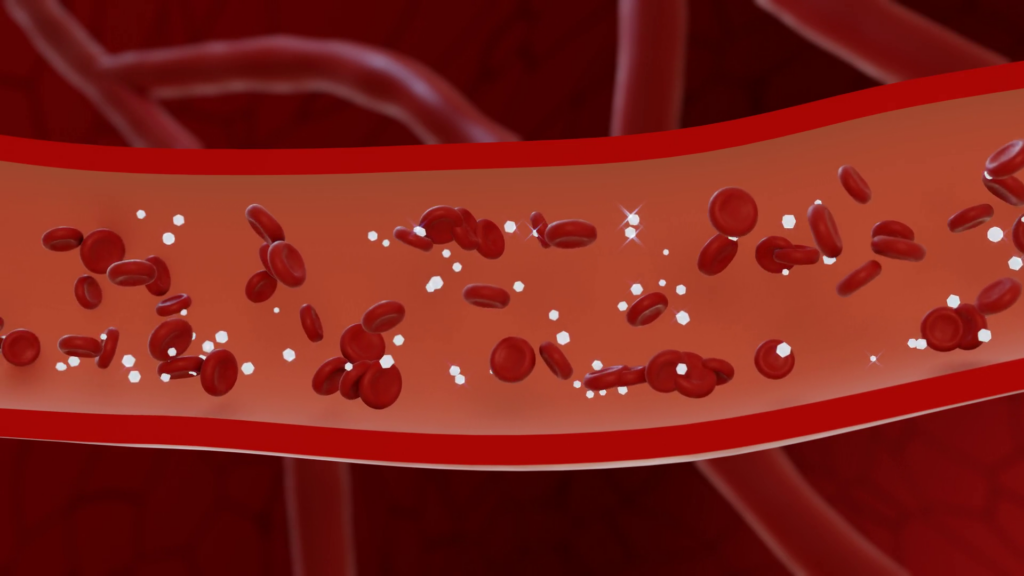
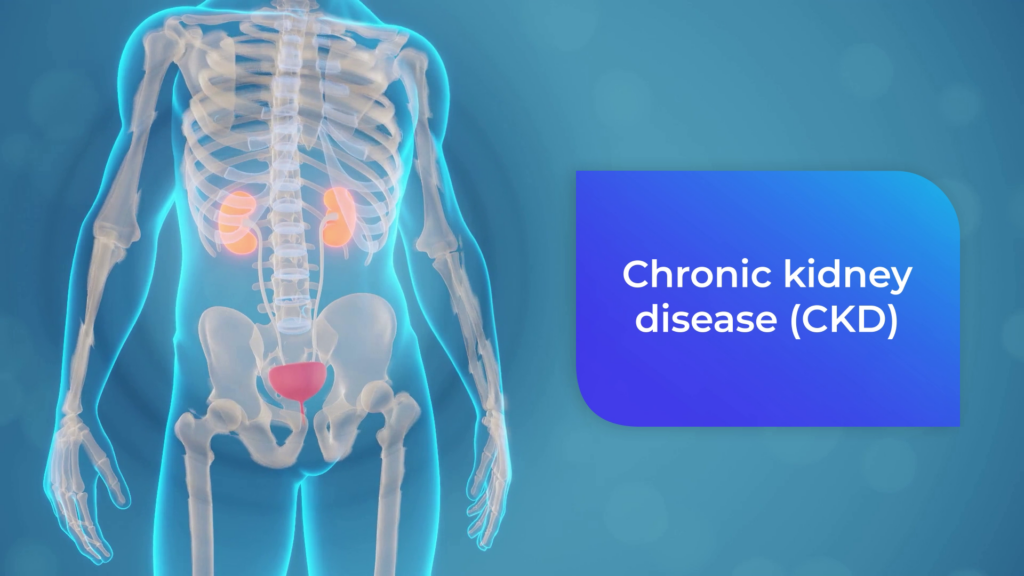
Written text
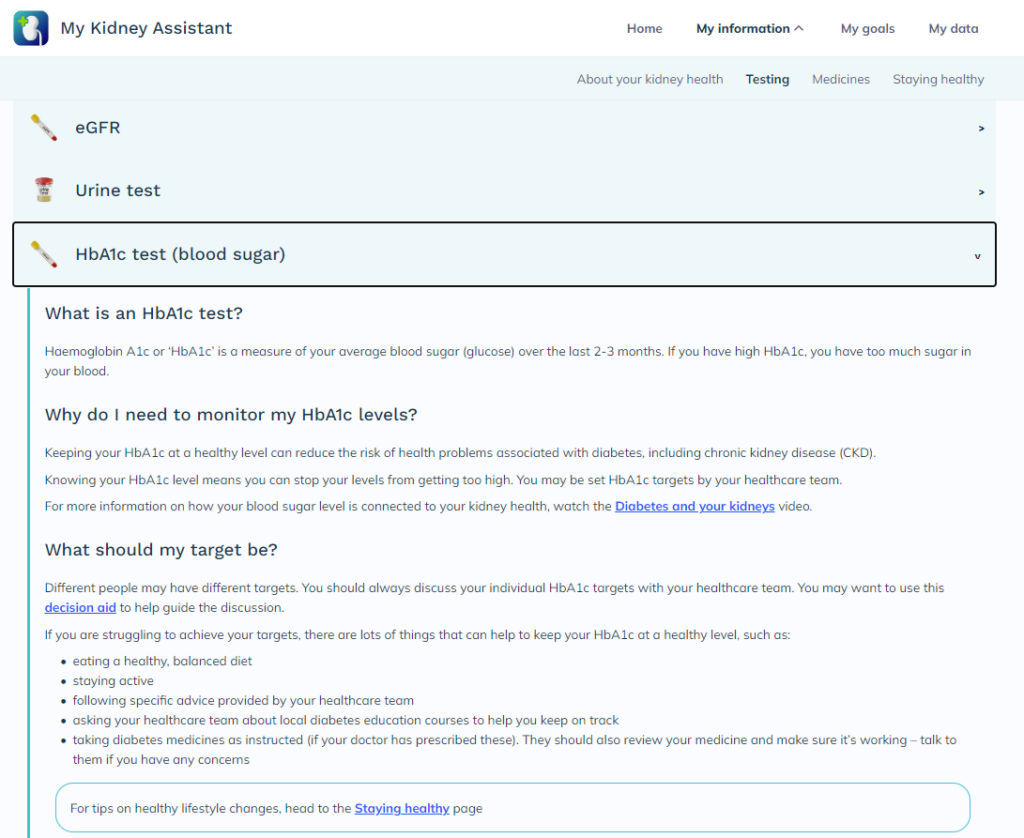
Graphics
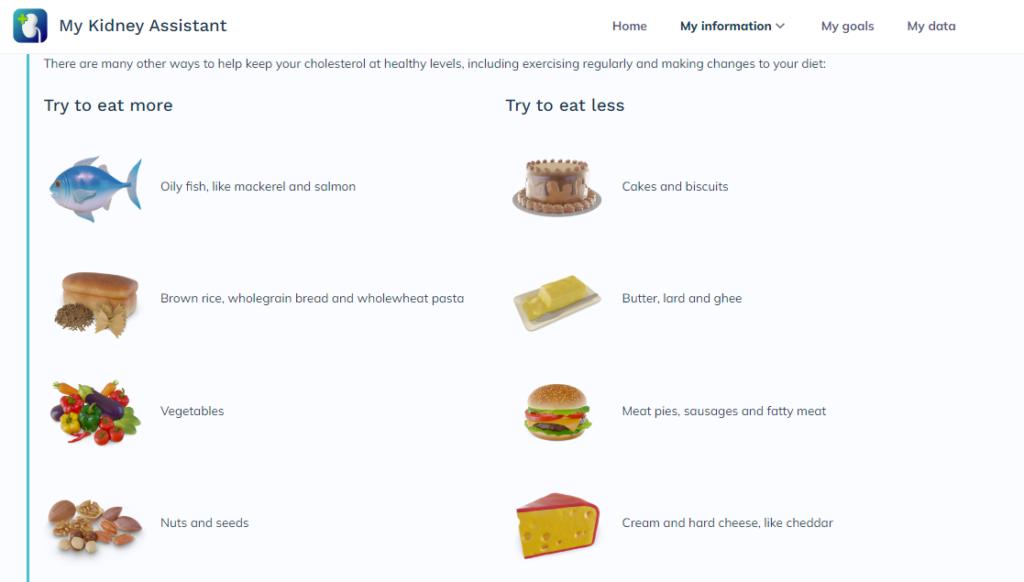
Personalisation
Users can take a questionnaire to find out which pages best address their information needs. Upon completion, it highlights the content that is the most relevant to them.
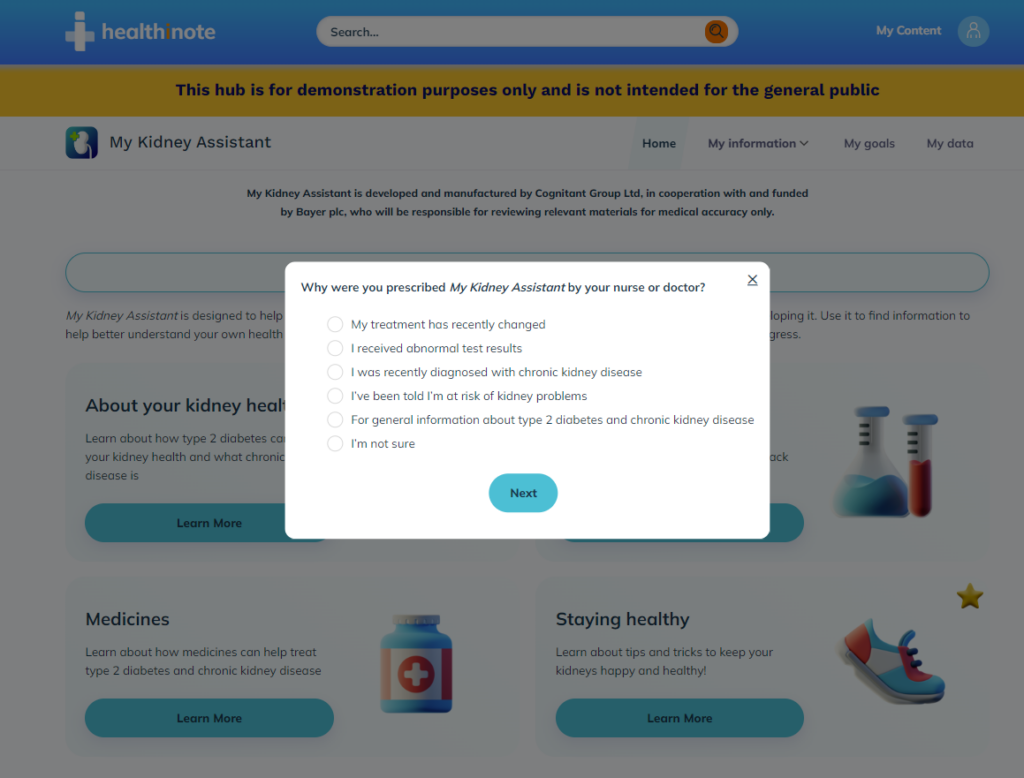
My goals and My data
My Kidney Assistant seeks to empower people to become an active agent in their healthcare journey and support the forming of healthy habits. Through their Healthinote login, users can set a range of health-related goals on the My goals page, such as to stop smoking, be more active or improve blood pressure. They can then record their health data and track their progress via the My data page, keeping them motivated to achieve their goals and improve their health.
My goals
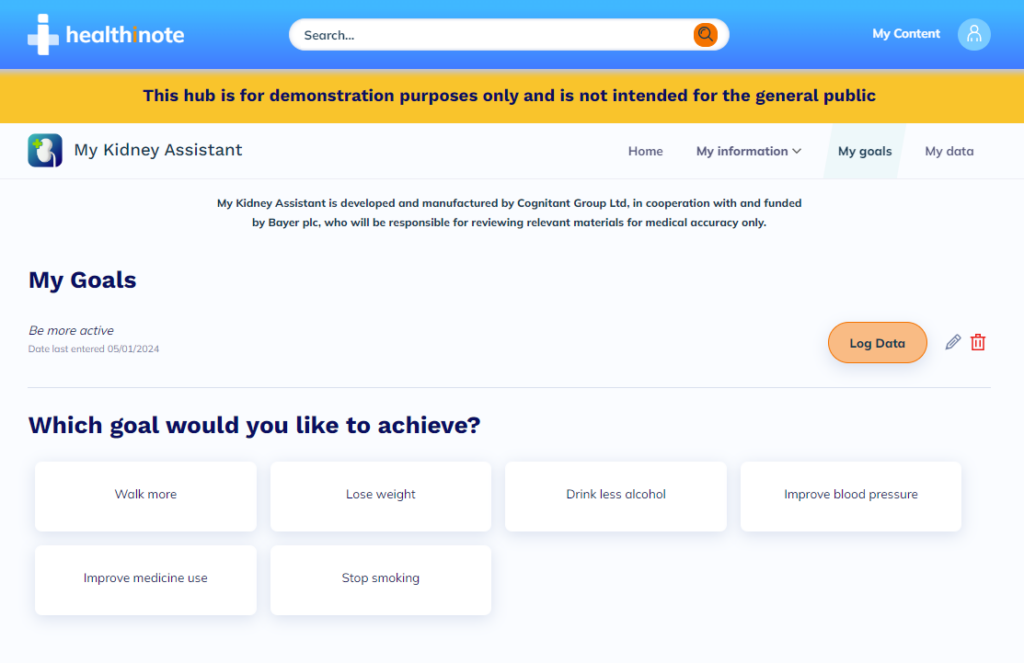
My data
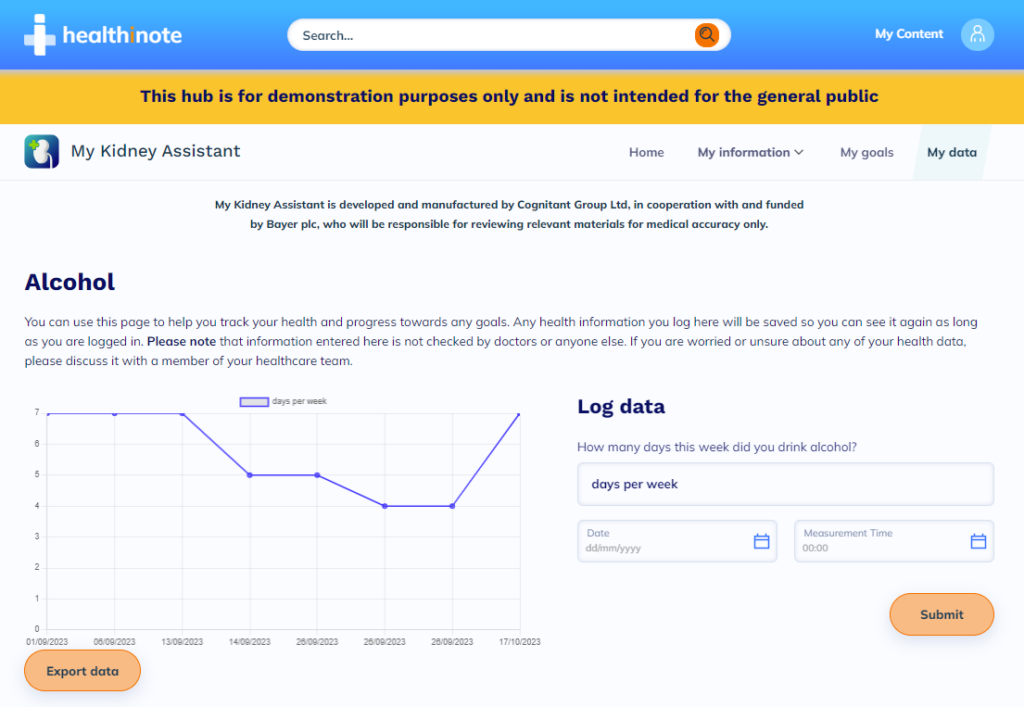
Future development
Following launch of the My Kidney Assistant pilot, user testing will assess how people are interacting with the digital education resource and its impact. Users will be sent an e-survey via their clinicians approximately three months after using My Kidney Assistant. This survey will assess various patient-reported outcome measures after using My Kidney Assistant, including:
- improvements in health literacy
- understanding of:
- the link between diabetes and CKD
- the relationship between blood pressure and CKD
- how medication can help and why it’s important
- what their test results mean
- reported intention to improve medication adherence
- reported sense of control over their health conditions
Metric analysis will also gather data on engagement with the resource, such as the number of unique users and unique sessions, and engagement with interactive features such as My goals and My data. The results of the patient-reported feedback and metric analysis will be used to iteratively improve the content and usability of My Kidney Assistant to optimise the resource and enhance the support provided to users during their healthcare journey.
If you would like to learn more or find out how to prescribe your patients My Kidney Assistant, contact us at https://www.cognitant.com/contact/
Declaration
My Kidney Assistant is developed and manufactured by Cognitant Group Ltd, in cooperation with and funded by Bayer plc, who will be responsible for reviewing relevant materials for medical accuracy only.
References:
1. Kidney Research UK. Economics of kidney disease. Available at: https://www.kidneyresearchuk.org/wp-content/uploads/2023/06/Economics-of-Kidney-Disease-full-report_accessible.pdf. Accessed February 2024
2. Cook S et al. Characterising the burden of chronic kidney disease among people with type 2 diabetes in England: a cohort study using the Clinical Practice Research Datalink. BMJ Open 2023;13:e065927
3. Khunti K et al. Prevalence and progression of chronic kidney disease among patients with type 2 diabetes: Insights from the DISCOVER study. Diabetes Obes Metab 2021;23:1956–1960
4. Nicholas SB et al. Living with chronic kidney disease and type 2 diabetes mellitus: the patient and clinician perspective. Adv Ther 2023;40:1–18
5. NHS England. Blog: Does health literacy matter? Available at: https://www.england.nhs.uk/blog/jonathan-berry/. Accessed February 2024 6. NHS. Content style guide – Health literacy. Available at: https://service-manual.nhs.uk/content/health-literacy. Accessed February 2024
7. Stømer UE et al. Exploring health literacy in patients with chronic kidney disease: a qualitative study. BMC Nephrol 2020;21(1):1–9
8. Taylor DM et al. Health literacy and patient outcomes in chronic kidney disease: a systematic review. Nephrol Dial Transplant 2018;33(9):1545-58
9. The Guardian/YouGov. Most NHS staff say they don’t have enough time to spend with patients. Available at: https://www.theguardian.com/society/2023/jul/24/most-nhs-staff-say-they-dont-have-enough-time-to-spend-with-patients. Accessed February 2024
10. Palanica A et al. Using mobile virtual reality to enhance medical comprehension and satisfaction in patients and their families. Perspect Med Educ 2019;8(2):123-27
11. Clemens KK et al. Clinical care gaps and solutions in diabetes and advanced chronic kidney disease: a patient oriented qualitative research study. CMAJ Open 2019;7(2):E258-E263
12. Burnier M. The role of adherence in patients with chronic diseases. Eur J Intern Med 2024;119:1-5
PP-MACS-GB-0192
Date of preparation: February 2024
Cognitant
Looking to empower people with health information for better patient outcomes?
Additional Case Studies
Co-Creating a Personalised Digital Storybook for Children with Atypical Hemolytic Uremic Syndrome (aHUS)
June, 2025
Challenge Atypical Hemolytic Uremic Syndrome (aHUS) is a rare, life-threatening disease characterised by blood clots forming in small vessels, leading to kidney failure, anaemia, and...
Asthma Essentials
January, 2025
[embed]https://youtu.be/qmeiwjCr9Go[/embed] The challenge: Asthma remains a major health concern in the UK, affecting 5.4 million people, including 1.1 million children. Each year, the condition leads...
Cognitant successfully streamlines a top 10 pharma Patient Support Programme
July, 2024
A top 10 pharma company challenged Cognitant to optimise their Patient Support Programme (PSP) for an injectable medication, with the aim to streamline approvals, save...